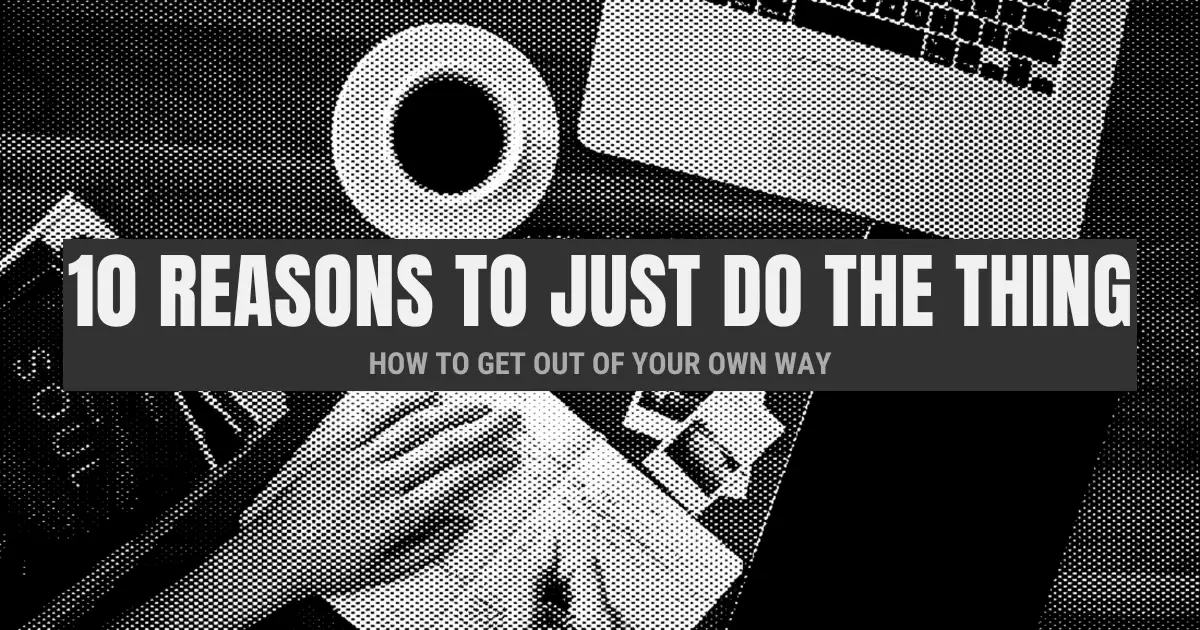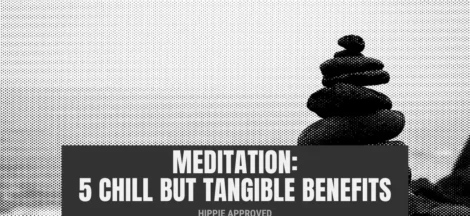Have you ever felt like there are some things you’ve been born on this earth to do? Whether they be hobbies, passion, work, or anything that feels like your life’s mission. Yet, despite this, when the time comes to sit down and do the hard work, it feels almost impossible to do. It could seem impossible due to a myriad of factors:
- Fear of what other people would think, or worse, what you’d think of it yourself.
- You could be burdened by the heavy expectations that you’ve set for yourself.
- Or it could stem from overthinking the task at hand and simply getting too overwhelmed to get started.
If any of the above reasons sound familiar, don’t worry. You’re not alone. I and many others feel the exact same way. And in this article, I’ll be going through the works of Steven Pressfield, James Clear and Mel Robbins, condensing down what I’ve learned. I postulate to you “10 reasons why” you should just do the thing (whatever said thing is) and learn to simply get out of your own way.
If this is an article you’d want to bookmark to revisit, please feel free to use the table of contents below to quickly jump to the sections you’d like to revisit.
- Reason 1: You'll never feel 100% ready
- Reason 2: Action builds momentum
- Reason 3: Imperfect action is better than no action
- Reason 4: Regret is worse than failure
- Reason 5: You'll learn more from doing than from thinking
- Reason 6: You'll inspire others
- Reason 7: Your future self will thank you
- Reason 8: Action helps you overcome fear
- Reason 9: Action creates opportunities
- Reason 10: Life is short
- Conclusion
Reason 1: You’ll never feel 100% ready
It’s admirable to be prepared. To want to be ready before you start any endeavour, in an ideal world. Yes, in an ideal world, this would be what all of us would aspire to, but alas, we don’t live in such a world. Being a 100% ready before you start, is about the same as expecting to be a world champion runner on your first attempt. High achievers aren’t born with the silver spoon achievement in their mouths. They get to where they are with time and practice. Likewise, when you start, it’s more important to start wherever you are in the process, be it at 1%, 20%, or even 0%. It’s more important that you start somewhere than having not started at all.
This is where Mel Robbins’ “The 5 Second Rule” can help you. Simply put, her rule states that if you have the instinct to act on a goal, you must physically move within 5 seconds before your brain has the chance to kill it.
She argues that using the rule can help you take action on a goal or commitment before your mind has a chance to talk you out of it.
This is a really effective technique as it avoids contemplating our current state of readiness by pushing us into a state of action, which can then compound into actions building momentum.
Reason 2: Action builds momentum
People say actions speak louder than words. I’m inclined to agree, but I’d also like to add an addendum. Actions speak louder than thoughts. Or more specifically, the thoughts of doing the thing we’d really like to be doing.
Before we take actions we live inside the thoughts in our heads. Here we’re free to think about how we can set things into action. But in doing so we can either imagine the best-case scenario or, we can however also catastrophise the worst-case scenario. At the end of the day, regardless of which side you lean on, that’s all it is, thoughts in our minds. When we push ourselves to take action, however, we’ve already taken the first steps towards actually doing the thing. Whether it’s writing your first words on a page, typing down the first page of your manuscript, your first brush stroke on the canvas, or even recording the first minute of a YouTube video. It’s now much more real and tangible. You’ve begun the process! Congratulations! Give yourself a pat on the back, you’ve earned it!
Now comes the second part: continuing the small train of actions, using what you’ve learned about the “5 Second Rule”, and re-applying it again. And then again with another small action. Before you know it, you’re on a roll. A steam engine of action with purpose.
James Clear in his book “Atomic Habits” talks about this very same phenomenon. He stresses the importance of taking small, consistent actions. These actions help in setting the identity of the self that you want to be, and they then get reinforced by your actions.
For example: before you start writing, you might imagine a possible version of yourself that writes. It’s an identity you’d like to assume, but before you actually take action, it’s nothing more than that, an assumed identity. But as soon as you start stacking small consistent actions towards the identity you’d like to assume, you’re no longer assuming it. You are it. It creates a mind-shift change. You might not be the best at the thing you’re doing, but you’re on the path, which makes it all the easier to keep building and improving, and it’s a lot better to be imperfect in your action than not taking any action at all.
Reason 3: Imperfect action is better than no action
Perfectionism can become a barrier to progress when we confine and constrain ourselves to that ideal.
We often assume it’s better to wait for something, whether that be motivation, inspiration, or even perfection before we feel it meets our criteria of what good or creative work is. But honestly, it’s quite the opposite. Seth Godin in his work about just “Shipping the Work” argues that we do the work and then become creative, and not the other way around.
So once we’ve begun the train of action, it’s important to not be too self-critical of our work and just keep at it. As Seth puts it “If you want to be a runner, go running. Go running every day and now you’re a runner.” So if you keep putting in the effort and keep the chain of small actions going, you are undoubtedly going to arrive at the destination that you had set for yourself. And in doing this consistently and achieving your goals, you can also avoid building up regrets of “what could have been” in the future. As we’ll soon discover, you’re better off with failure than regret.
Reason 4: Regret is worse than failure
Regret is one of the worst emotions that we as humans can experience. It can be a powerful emotion that can linger for years or even a lifetime. When we don’t take action and pursue our goals, we may look back on our lives with a sense of disappointment or wonder “what if?”. This can lead to feelings of regret, which can be a heavy burden to carry.
On the other hand, there’s failure. When we try something new, take a risk, or in this case “do the thing”, there are bound to be times that we fail. Failure is a natural part of the learning process. However, failure can also be an excellent opportunity to learn and grow, and can ultimately lead to success.
Failure can often be a manifestation of “Resistance,” a concept coined by Steven Pressfield in his book “The War of Art.” Resistance is the internal force that tries to prevent us from taking action and pursuing our goals, often through fear and self-doubt.
When we let Resistance win, we may avoid taking risks and pursuing our passions, which can ultimately lead to regret. This is where Pressfield’s idea of “turning pro” comes in: we must recognize that Resistance is a natural part of the creative process and that the best way to overcome it is to simply show up and do the thing, regardless of how we feel.
When we commit to “turning pro” we, in effect, commit to showing up every day, facing Resistance head-on, and doing the thing no matter what. This mindset helps us to overcome the fear of failure, as we begin to view failures as opportunities to learn and grow, rather than as sources of shame and regret. And, in doing more of the thing, we learn as a result. We can always learn more from doing than thinking.
Reason 5: You’ll learn more from doing than from thinking
It’s always better to take action than to spend more time than necessary thinking about doing things. When you spend more time thinking than doing, it can become easier to pigeonhole yourself into two trains of thought:
A) You could catastrophise outcomes, or
B) You could fantasize about possible positive outcomes
Neither of the two is particularly useful to you.
Think about it, if you spend an inordinate amount of time catastrophising the outcomes of taking action, all it will eventually end up doing is sapping you out of your will or desire to eventually do the thing. Your mind can then become myopic when faced with these “potential doomsday scenarios: and completely freeze you in your tracks of inaction.
The alternative, whilst sounding better, is undoubtedly much worse. Like a siren song that sinks sailors out at sea with the allure of good times. In this scenario, you might imagine doing a good job at your task, feeling happy about doing so, and in effect absorbing the gratification of completing the task without actually doing anything. This can also then compound by daydreaming about big accomplishments that you could achieve by doing more of the thing. The only problem is, all the work and efforts are completely fictitious, and this entire exercise is wish-fulfilment without any of the real work.
There was a period of time in my life back when I was a kid. I had a vivid imagination as most 13-year-olds do. Any time I would observe my peers perform on stage, I used to mentally criticise their shortcomings, and used to fantasize about how much better I could perform if I were in their shoes. But here was the problem, I could never get myself to actually get up on stage and do anything like what I saw. The amount of resistance and negative self-talk that I’d built up inside of myself had absolutely crippled me from doing anything about it. So I would just take solace in knowing that I could be better than anyone else, had I been exposed to the right circumstance without actually doing any of the actual work.
Eventually, when I got older, I overcame my stage fright, and my social anxiety and managed to perform on stage. And, well, I completely bombed! I could barely contain my nerves. The only performance I could muster at the time was a “bathroom singing act”. I was barely audible or even on key. It was a complete failure. But I realised without any doubt in my mind how different my imagined perception of reality was in comparison to actual reality. If nothing else, it actually motivated me to keep doing the thing, practising and getting better. And when I actually did commit to that version of myself, I did make real progress. And in doing the work and becoming better, you can also inspire others!
Reason 6: You’ll inspire others
People learn from those around them. It doesn’t matter if we’re talking about family, peers, or friends. We’re influenced by those we surround ourselves with, wittingly, or unwittingly. And this influence goes both ways. If you’re someone who finds it difficult to make positive changes for yourself, you can just as easily flip the script and make it about making the lives of those around you better. How? By making positive changes such as doing the thing you’re meant to do, setting an example for those around you, and encouraging them to be their best selves as well. It’s amazing how much goodwill a few simple positive actions can bring!
Before I got started on my own entrepreneurial journey, I was surrounded by people who had themselves been inspired. It made me really question why I wasn’t making more of myself. It made me think hard about what was really holding me back. And that’s when I realised that my fears and insecurities were becoming the shackles to my own liberation. That’s right! There was no external force or reasons why I couldn’t do the thing or be successful, it was just a mixture of negative self-thought, low self-worth and catastrophising outcomes that were holding me back. When I realised the root of it, I wanted to do everything I could to do better, and become a (hopefully!) better version of myself. When you do this, even your future self will be thankful!
Reason 7: Your future self will thank you
Actions taken today can have a profound impact on our future, this is where the phrase, “Your future self will thank you,” comes from. It’s a reminder to us that when we take action towards our goals, we are setting ourselves up for a better future.
This point is also emphasized by James Clear in his book “Atomic Habits,” where he stresses the importance of making decisions that benefit our future selves. James explains that the small choices we make, towards doing the thing, every day can add up to big changes over time. By focusing on making decisions that benefit our future selves, we can create positive habits that support our long-term goals.
Let’s say that your goal is to write a book. If you write just one page per day, you will have a 365-page book by the end of the year. This seemingly small action at the moment can have a huge impact on your future. It will allow you to achieve your goal of writing a book and will be able to reap the benefits of being a published author.
On the other hand, if you don’t take action towards your goals, you may look back on your life and wonder “what if?” This can lead to feelings of regret and disappointment, as you realize that you missed out on opportunities to improve your life. It can further compound what we discussed in Reason 4.
So, the key takeaway is that taking action now can benefit your future self. By making small decisions that support your long-term goals, you can create positive habits and set yourself up for success. As James Clear reminds us, it’s important to make decisions that benefit our future selves and to focus on taking action today to help create that better future, as actions can help us overcome our own fears.
Reason 8: Action helps you overcome fear
As we’ve discussed earlier, when you take action towards your goals, you start to build momentum and momentum breeds confidence. And confidence helps you to mitigate fear. As this confidence gets built over repeated action, it can in turn help you build evidence and the case against fear since it’s not an intangible thought anymore, you have actual proof of the work you’ve been doing!
As discussed in Reason 1, Mel Robbins in her book “The 5 Second Rule” emphasizes the power of taking action to overcome fear. Her “5 Second Rule” technique helps you to stop overthinking and take action. You have effectively overcome fear and self-doubt by taking the action. This action and repeated actions in time build ammo against your fear. This confidence in turn can give you more of the push to keep doing the thing and take more action!
As you continue to take action, your confidence grows, and you become more and more empowered to pursue your dreams.
Reason 9: Action creates opportunities
“Put yourself out there! You’ll never know what opportunities lie in wait for you!”
No matter how many times you might have heard this said, it still can’t be underscored how true it is!
When you put into action what it is you want to do, over time you’re bound to accumulate a wealth of experience, information and learning. This in turn invites you to take on more engaging and involved work, and as the work you engage in becomes sophisticated, so do the teams and people you’re surrounded by.
As mentioned in Reason 4, when we commit to “turning pro” about whatever we set our mind to, it isn’t just the mindset that changes, our work reflects our mindset shift as well. And well, who do professionals work with? Other professionals! And in doing so, your opportunities to grow, collaborate and acquire new skills also grow along with it. You may never know what opportunities are lurking around the corner when you decide to take action and keep doing the thing you were meant to do!
Let’s discuss a real-life example. When I first took a stab at starting a business, I did it in partnership with a couple of friends. At the time I knew I had some skills that I could market and sell, but I didn’t know the first thing about business. Nonetheless, I kept at it, one project at a time. In a couple of years, just by continuously improving and doing the work, I came to realise what my values were, what type of work I found most fulfilling and how exactly I wanted to work. So in just 3 years from when we began the partnership, I was ready to start my own entrepreneurial journey. I bet on myself and started Daris in 2020. Yes, the year of COVID. You’d think that’s a crazy thing to do, but let me tell you, I have never felt so sure about anything in my life. I had confidence in the skills I had acquired, I was sure of the goals and values I was aligned with, and most importantly I was sure of the kind of work that I wanted to do for the rest of my life. So I bit the bullet and just did the thing! Doing so really opened me up to so much learning, and growth and I can’t be more thankful for having made the decision, because ultimately, life is short!
Reason 10: Life is short
When we procrastinate or avoid taking actions that are aligned with our goals, we essentially waste valuable time. Time is something that can never be brought back as it is the most valuable resource. Life is short. And we only live once, so it’s important to make the most of the time we have left and pursue our goals with a sense of sincerity and urgency.
Steven Pressfield in his book “The War of Art” emphasizes the urgency of pursuing our goals, and reminds us that our time on this earth is finite. He writes that “the most pernicious aspect of procrastination is that it can become a habit. We don’t just put off our lives today; we put them off till our deathbed.”
Pressfield urges us to break the cycle of procrastination and to start taking action towards our goals today. He emphasizes the importance of focusing on the process of creation rather than the end result, encouraging us to make the most of the time we have by taking action and pursuing our passions.
When we realize that life is short, we are more likely to take risks and pursue our goals with urgency. It puts all our priorities in order, we become less likely to let fear and self-doubt hold us back, and more likely to take action towards the things that truly matter to us.
Conclusion
In conclusion, there are many reasons why you should just do the thing and get out of your own way. We’ve covered 10 of these reasons in this article, including the fact that taking action helps you overcome fear, regret is worse than failure, and your future self will thank you. Additionally, you can refer to the image below if you want a quick snapshot of all the reasons.
By taking action towards your goals, you can start to build momentum and confidence, which will help you achieve your goals and live a more fulfilling life. Whether you’re pursuing a personal project, a new career, or simply trying to make positive changes in your life, taking action and doing the thing is key.
So, I encourage you to take action and get out of your own way. Don’t let fear or self-doubt hold you back. Use the insights and tips shared in this article to help overcome resistance, build confidence, and achieve your goals.
As a call to action, I encourage you to take one small step towards your goals today. It could be as simple as making a to-do list or setting a specific goal for the day. Whatever it is, take action and start building momentum towards your dreams.
And as a final question, I ask: What’s one thing you can do today to take action towards your goals? Leave a comment below and let’s inspire each other to take action and become the best versions of ourselves!



 Meditation: 5 Chill but Tangible Benefits (Hippie Approved)
Meditation: 5 Chill but Tangible Benefits (Hippie Approved)
One Reply to “10 Reasons Why You Should Just Do The Thing (How to Get Out of Your Own Way)”